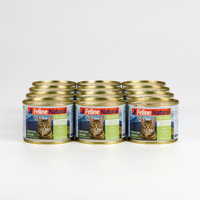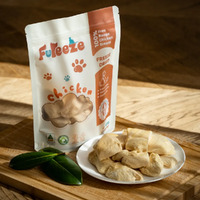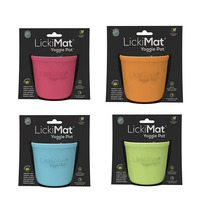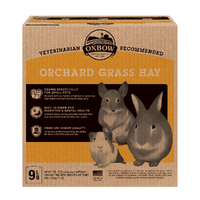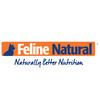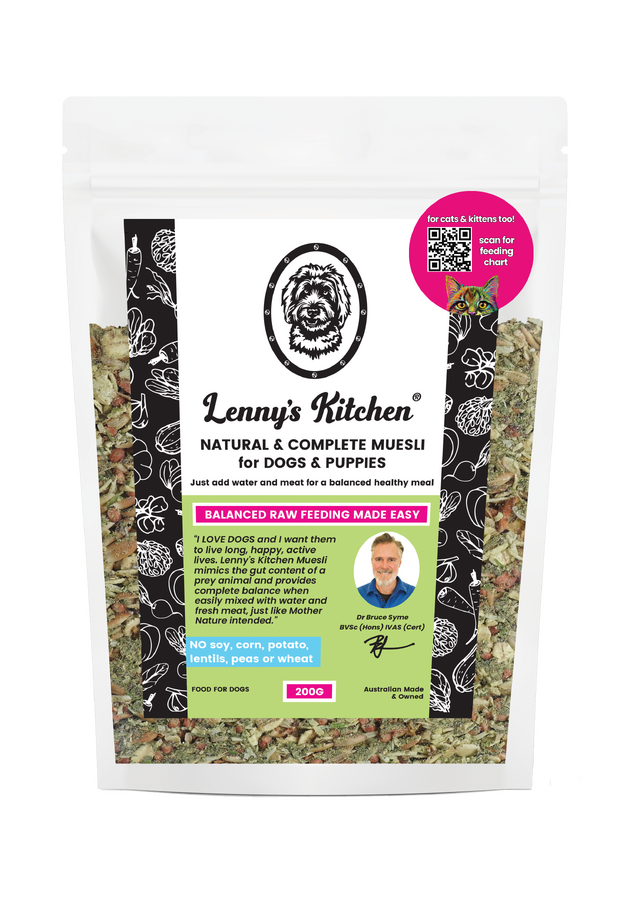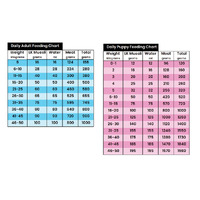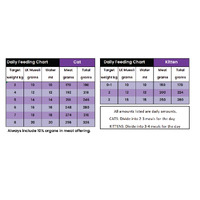Lenny’s Kitchen Muesli is formulated in conjunction with renowned and respected Australian Vet, Dr Bruce Syme BVSc (Hons). Dr Bruce practices as an Integrative Vet, blending conventional and complementary therapies to achieve the best outcome. He has been a passionate advocate for raw, natural feeding for over 30 years.
Lenny’s Kitchen Muesli is a lasting tribute to our beautiful, kind Labradoodle, Lenny. Thanks to a fresh raw diet, lots of love and the care of Dr Bruce, Lenny lived a very healthy, active and happy 17 years.
Lenny’s Kitchen Muesli contains 18 air dried raw ingredients, including herbs, plants, vegetables, fruit, vitamins, minerals and essential nutrients. We pride ourselves on sourcing local ingredients wherever possible. Our Muesli is suitable for all life stages. Follow the feeding guide to prepare the right amount for the Dog or Puppy in your life.
When soaked with warm water for just 5 minutes, Lenny’s Kitchen Muesli mimics the gut content of a prey animal- the first food eaten after capture in the wild. Mixed with the suggested amount of raw, fresh meat (including 10% organ meat) it becomes the perfect balanced meal to promote health and longevity.
Lenny’s Kitchen Muesli contains 18 air dried raw ingredients, including herbs, plants, vegetables, fruit, vitamins, minerals and essential nutrients. We pride ourselves on sourcing local ingredients wherever possible.
Oats
Lenny’s Kitchen Muesli contains rolled and crushed oats, grown chemical-free in the Western District of Victoria. Oats are dense with fibre, are gluten and sodium free, improve immunity, nourish the skin and coat, and promote healthy digestive function for dogs and puppies.
Oats contain phytochemicals called avenanthramides that have antioxidant, anti-inflammatory, and antihistamine properties. A great source of plant-based protein and iron, oats are satisfying, help stabilise blood sugar levels and can reduce the risk of obesity. Oats contain vitamins B1, B2, B3, B6 and B9, Omega 3 and Omega 6 fatty acids.
The larger rolled oat grains provide faecal bulk and are often visible in the stools. This aids in preventing anal gland impactions, more common in smaller dogs.
Shredded Coconut
Dried coconut meat is high in lauric acid, a medium-chain fatty acid that is an energy source for dogs and puppies. It possesses anti-inflammatory properties, which may help prevent arthritis. Packed with antioxidants that help boost the immune system, it can speed up the healing of wounds, cuts, and hot spots. Coconut's antibacterial and antiviral properties help protect the body against harmful bacteria, parasites, and viruses.
Sorghum
Sorghum, is a whole grain rich in antioxidants, vitamins, and minerals, including B1, B2, niacin, iron, and zinc. It is gluten free and high in fibre to promote healthy digestion. It’s also a rich source of magnesium, a mineral that’s important for bone formation, heart health, and over 600 biochemical reactions in the body, such as energy production and protein metabolism.
Flaxseed Meal
Flax seeds are a good source of protein and fibre. The seeds contain significant levels of Omega 3 fatty acid which are anti-inflammatory, improve immunity and enrich skin and coat health.
Alfalfa (milled)
Alfalfa is a nutritive herb and source of protein. One of the richest sources of vitamins and trace minerals, calcium, magnesium, potassium, beta carotene, vitamins A, B12, C, D, E and K. Alfalfa contains high levels of the antioxidant, chlorophyll, which supports regeneration of red blood cells, boosts energy, detoxifies the bloodstream, cleanses the digestive tract and eliminates free radicals. Lenny’s Kitchen Muesli contains organically grown Alfalfa from Victoria’s Mallee Region.
Dried Carrot
Carrots are low in calories and a valuable source of antioxidants and phytonutrients. The richest source of beta carotene (Vitamin A), carrots and are excellent for vision, strengthen immunity, promote cell growth and organ health.
Pumpkin Powder
Pumpkin Powder is a rich source of antioxidants, protein, fibre, vitamins, and minerals. It is low in fat and high in calcium and an excellent source of starch and protein. Pumpkin Powder contains high levels of immunity-boosting nutrients, including Vitamin C and Vitamin A, the polysaccharides in pumpkin powder, can aid in reducing blood sugar levels for diabetes management.
Dried Pumpkin
Pumpkin is an excellent source of iron, potassium, and vitamins A, C and E. Pumpkin is high in fibre, aids digestion and contributes to faecal bulk to allow for healthy stools.
Parsley Flakes
A potent green food containing high levels of vitamins, minerals, and antioxidants to boost immunity and prevent cell damage. Parsley is rich in fibre which promotes a healthy digestive system and supports kidney health by helping the body flush out toxins. Its anti-inflammatory properties can benefit dogs with arthritis and inflammatory disorders.
Barley Grass
The barley grass in Lenny’s Kitchen Muesli is grown organically in Victoria’s Mallee region.
A natural multi-vitamin, Barley Grass provides all the vitamins, minerals, trace elements, enzymes, fibre and special nutrients like chlorophyll essential in the diet.
Calcium Powder
Calcium aids in absorption of vitamins and minerals. It is essential for building and maintaining healthy bones throughout life. Calcium combines with other minerals to form hard crystals giving bones strength and structure. Almost 99% of the body’s calcium is found in the bones. A small amount of calcium is absorbed into the blood and used for the healthy functioning of the heart, muscles, blood, and nerves. Bones act like a calcium bank. If there is not enough calcium in your dog’s diet the body will take what is needed from the bones for use in other parts of the body. This will affect bone density and may lead to arthritis and degeneration. Calcium carbonate is sourced from the minerals calcite and aragonite. It can also be found in chalk, limestone, eggshells, gastropod shells, shellfish skeletons and pearls.
Nutritional Yeast
Vegan and gluten free, Nutritional Yeast is high in protein, a source of fibre, low in fat and promotes immunity. It’s packed with B group vitamins which support important functions, including nerve, heart, blood, mood, skin and eye health, it aids in reducing inflammation and supports hormonal function. Vitamin B1 aids metabolism and digestion, Vitamin B2 is an antioxidant, Vitamin B9 boosts mental agility, and Vitamin B12 is an essential vitamin that’s vital for maintaining energy levels. It has a delicious, cheesy taste too!
King Island Seaweed
Harvested from the pristine, nutrient rich waters near Tasmania, King Island Seaweed is a rich, natural, source of iodine vital for normal thyroid function, which controls metabolism. It contains over 60 mineral and trace elements, 21 amino acids, simple and complex carbohydrates.
It stimulates the digestive system, enabling greater absorption amount of nutrients resulting in overall improved health, and resistance to parasites and diseases.
Sunflower Lecithin
Sunflower lecithin is extracted naturally, without chemicals. It is a powerful antioxidant and an abundant source of phosphatidylserine, which effectively combats prevents muscle soreness, improves recovery, and overall well-being. Sunflower lecithin has a positive impact on heart health, liver function and acts as an emulsifier to break down large fat cells. Sunflower lecithin reduces inflammation of the cells and fights against oxidative stress. It protects brain cells and supports cell regeneration. Lecithin is also a potent source of choline, which is used to produce the myelin sheath on nerves and in brain tissue.
Turmeric
A natural pain reliever and helps prevent the development of diseases. Turmeric contains Curcumin, a powerful antioxidant with anti-inflammatory properties, it can help reduce joint pain and swelling and improves digestive health by reducing gut inflammation. Turmeric may relieve symptoms of arthritis, irritable bowel syndrome and colitis. It can have very beneficial effects in treating and managing allergic skin disease.
Vitamin C Powder
Strengthens the immune system, aids in managing stress. It is also an integral component of collagen, the matrix of tissue that forms skin, tendons and ligaments, bones, arteries, and veins and even the cornea of the eye. Vitamin C is vital to the healing process.
Diatomaceous Earth
Diatomaceous earth is packed with natural minerals, magnesium, silicon, calcium, sodium, iron, potassium, copper, zinc, phosphorous, and selenium. As a nutritional supplement, it can improve sleep, boost energy, promote healthy skin, hair, and nails. It is a natural flea repellent.
Garlic
Garlic has antiseptic, antimicrobial, antifungal, and antibiotic properties that help prevent infections and diseases. It boosts the immune system, enhances liver function, lowers blood cholesterol and triglyceride levels, and assists heart health. Garlic contains sulphur which naturally repels fleas. At low levels garlic is a safe additive in any petfood.
Soak for 5 minutes in warm water, then add to your choice of meat.
FOR FEEDING GUIDE PLEASE SEE PICTURES 2 FOR DOGS AND 3 FOR CATS.
| Crude Protein (min.): | 16.5% |
| Crude Fat (min.) | 6.8% |
| Crude Fiber (max.) | 2.1% |
| Moisture (max.) | 66.1% |
Which Meat Should I Choose?
Kangaroo
This is my preferred choice of meats. Fresh kangaroo meat has been widely used in Australia as pet meat over 30 years, and more recently, it has made significant in-roads into the human food industry, with food professionals and nutritionists extolling its health benefits, great taste and versatility as a premium table meat. Nutritionally, kangaroo meat is superior to all the farmed meats. It is low in fat (3 - 4%), high in protein, and high in vitamins and minerals.
Because kangaroo is not farmed, the meat is truly free range, and organic. Kangaroos graze a very wide variety of pastures, wild grasses, shrubs and trees, and as a result of this variety, they enjoy excellent health, and their meat has a wide array of macro and micro nutrients. Kangaroo is considered a “cooling” meat, as it lives in a very dry and arid environment, and as such, is ideal for treating pets with food allergies. Culling of Kangaroos is a very closely controlled, government regulated business.
Beef
Beef is one of the most widely available and most commonly used meat source for pet food, second only perhaps to chicken. Beef and beef by-products (by products indicating non-meat parts of the body like offal, bone, feet and horns) are the major red meat sources. The majority of beef used in processed pet food is actually meat meal a combination of all non-useable or non-saleable body parts from the abattoirs (eg bones with meat scraps left on, offal, contaminated carcass parts etc) which is ground to a pulp and then dried at high temperature to produce a powdered product. Meat meal generally forms the protein component of dry foods, and is also used, in combination with milled cereal and gelatine, to form the “meaty chunks” in tinned pet foods.
Fresh beef is not as commonly used as pet food, often due to price constraints and demand for table meats and export. Nutritionally, beef can be quite good, if it is raised naturally on pasture. It has good amounts of protein, and can have quite high fat content (14%+), and this level can be much higher in grain fed beef. In Traditional Chinese Medicine, beef is seen as a “heating” meat, because it originates from a colder climate. Beef is often raised using traditional farming practices, which include the use of chemical fertilisers, herbicides, drenches and antibiotics. Free range, organic beef can have a lower fat content than the traditionally farmed product, cost per kilo is higher.
Chicken
Chicken meat and by products are the most common source of pet meat used in commercial pet foods. This is primarily driven by price. Chickens are the most cheaply and intensively farmed of all the domesticated animal species. The commercial chicken industry’s methods are not based on the traditional image of chooks running around the farmyard. Although times are changing, battery farms still exist and chickens are raised and housed in sheds (in cages) their entire life, and are fed a man-made diet from birth. They can suffer from vitamin D deficiency by not being exposed to sunlight, no green grass or shoots to feed on, and no natural antioxidants. Antibiotics are often added to feed minimise the death toll, and a range of growth promoters. Nutritionally, chicken mince is highly questionable. It can be very high in fat (18%+), and even higher if the mix contains skin and fat. There is no doubt that wild chickens would be an ideal prey for both cats and dogs. A wild (organic) chicken would also provide excellent nutrition, as do their eggs. The very fact that they are relatively slow moving, and fly only when absolutely necessary would place them high on the predation list.
Turkey
A close relative of the chicken, turkey meat is becoming a more popular choice of meat for pet foods. It combines both 70% white meat and 30% dark meat, is both high in protein and low in fat (except for the skin). Turkey is a good nutritional source of iron, zinc, potassium and phosphorous, and contains vitamin B6 and niacin. Turkey farming is nowhere near as intensive as chicken sheds, and most birds enjoy a lot more space and outdoor time.
Goat
Goat meat, also known as Chevon, Capretto or Cabrito, is the most widely eaten meat in the world. Popularity in Australia is increasing as diversity in population grows. Feral goat meat is now commonly fed as pet meat. Goat is available at many butchers, and is becoming more widely available in supermarkets due to the demand attributed to its use on television cooking shows. Goat meat is lean and lower in fat and cholesterol than chicken, lower in calories than beef, lamb and pork and contains iron levels higher than beef. The taste is described as being similar to lamb.
Venison
The meat sourced from deer, whether by hunting or farming, is known as venison (from the Greek, to hunt). It is also very high in protein and low in fat, and is an excellent choice as a unique protein source when managing food allergies. Venison is generally easy to purchase from butchers and some pet meat suppliers.
Lamb & Mutton
Lamb has recently become a popular meat source for pet food, introduced a “unique” source of protein, driven by the increase in targeting allergic skin conditions in dogs and cats. Due to cost, that the majority of lamb sold as pet meat is actually mutton, older sheep. Nutritionally, lamb is very good. It does have high fat content, much like beef, but it is all pasture grown, under good conditions, and the meat is of high quality. Lamb is also considered a “heating” meat, as sheep are native to cold climates. Lamb shanks are, however, a common choice for a good meaty bone.
Pork
Pork is again high in fat and often not well tolerated digestion wise by many pets. Meat meal made from pig carcasses is used in the manufacture of some pet treats, but on the whole, it is little used. Pigs are also very intensively farmed in modern countries, and suffer a similar fate as battery chickens, being raised and housed indoors, and being fed a man made ration, complete with antibiotics and growth promoters. Pigs are also highly sensitive to stress, suffering from a condition known as PSS (porcine stress syndrome), which can cause severe detrimental changes to the meat at slaughter.
Fish
Fish and fish meal has long been used in pet food, primarily in cat food. Fish meal is commonly used as a protein source, and flavouring agent, in many dry cat foods. Most fish fed to cats and dogs is tinned, not fresh, and is therefore not as nutritionally valuable. Many people use sardines or tuna, assuming that the naturally high levels of fish oil are of benefit – in truth, the cooking temperatures used in the canning process have significantly, if not totally, reduced the omega 3 content of the oil.
Fish meat is a very good source of protein, low in fat, and high in vitamins and minerals – when it is first caught. If you were to buy fresh fish and lightly cook it for your pets, it would be very good. It is also worthy of note that freshwater fish do contain levels of thiaminases, which can cause vitamin B1 deficiency if used exclusively as a
diet. Whilst cats certainly enjoy the taste of fish (probably the salt), they are the last animal to be seen getting their feet wet – so we must conclude that fish is actually not a natural part of the cat’s diet. Cats can also react allergically to some of the deep water fish, like tuna, which can present as a generalised skin problem, with itching around the head and ears. Dogs may make the occasional attempts at catching fish in fresh water streams, but the only true fisherman is their close relatives, the bear.
Rabbit
Rabbit would have to be one of the most suitable all round meat sources for both dogs and cats. Wild rabbit is very similar to kangaroo, in the sense that it is a free range, organic meat, low in fat, and high in nutritional value. Until recently, wild rabbit has been widely available in Australia, but due to the introduction of the Calici virus, the supply of rabbit meat has largely been replaced with farmed rabbit, which unfortunately can fall victim to all the same problems as battery chickens.
Tripe
I will make special mention here of tripe as a meat source. Tripe is the common term for the stomach lining of cattle and sheep, also known as paunch. Green tripe is the term used for un-processed tripe and is highly nutritious as a meat source. It is very low in fat (2%), highly glandular (contains enzymes), and is loaded with probiotic micro- organisms. Tripe sold for human consumption has been washed in boiling water and bleached. In Australia, Green tripe is very affordable but not always easy to source, sold only as pet meat in a frozen state.
Tripe is also a “white” meat (meaning it has a low amount of myoglobin, the protein that makes red meat red), and has historically been used for dogs with sensitive digestive tracts, or food allergies. I have utilised tripe for some time now as an alternate to kangaroo meat for treating difficult cases of allergic dermatitis in dogs and occasionally cats with great results.
Offal
Offal is the collective term used for organ meats, like liver, kidney, heart, lung etc. Offal is very rich in protein, vitamins and minerals, and ideally, should make up about 20% of a dog or cats meat intake. As a general rule, offal meats should be purchased from your local butcher, and be human grade, as the organs are often home to various parasites, and only human grade organ meats have had additional inspection processes applied to ensure they are free of parasites.
Fabulous service and product.
Sheridyn 22 February 2024Went to the dog show and got a trial back in October. My dog absolutely loved it! I ordered more online, received a hand written note stating that shipping was cheaper than first thought with a little $10 note taped to it. Never have I received such fantastic customer service with the added bonus if a great product ❤️
(5)

